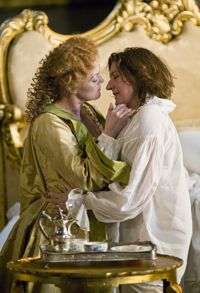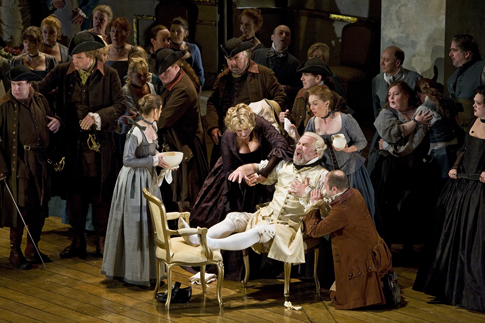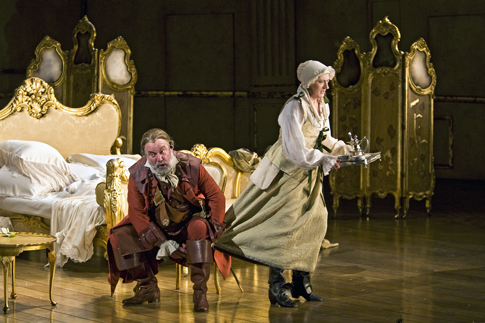![Sarah Tynan (Sophie) / Sarah Connolly (Octavian) [Photo © Clive Barda / ENO]](http://www.operatoday.com/Rosenkavalier_ENO_01.png)
04 Jun 2008
Der Rosenkavalier at ENO
It is worth remembering that prior to the première of Strauss’s opera in 1911, the working title was ‘Ochs auf Lerchenau’.
Opera producers in quest of headlines, unable to make them from the limited number of Mozart operas available (all of them far too familiar) but equipped with the flood of attractive young singers trained to sing Mozart in conservatories (because singing Mozart does not harm young voices, and singing Verdi and Wagner before 30 — better yet, 40 — often will), sometimes turn to Mozart’s contemporary, Cimarosa, and his Il Matrimonio Segreto, to get attention.
Handel’s Rodrigo, subtitled ‘Vincer se stesso è la maggior vittoria’ (Self-conquest is the greater victory) is one of the composer’s earliest operatic works, and rarely heard.
Chicago Opera Theater scored a resounding success with its area premiere of John Adams’ newest stage piece, “A Flowering Tree.”
Upon its premiere at Chicago’s Lyric Opera in 1997 Anthony Davis’ Amistad found little critical favor. Its undisciplined excesses led one writer to compare it to a high-school pageant.
In these days of 'concept' productions, it is rare that the curtain goes up on the first act of an opera and it looks exactly as one might reasonably expect it to.
I can still remember my first ever “Pelleas et Melisande” in my first ever outing at San Francisco Opera during my first ever visit to that beautiful town.
A recent visit to Berlin’s three opera houses yielded decidedly, nay wildly varying outcomes.
The Gotham Chamber Opera has been delighting opera fans on the Lower East Side for seven years now, one small audience at a time.
Thirty-six years after Sarah Caldwell and the Opera Company of Boston presented the first complete staged performances in the United States, Hector Berlioz’ Les Troyens returned to Boston in triumph in a series of concert performances presented by the Boston Symphony Orchestra under the baton of James Levine to close the BSO’s 2007-2008 season.
Opera companies should practice historic preservation, keeping certain productions forever in the repertory because of their quality and aesthetic value.
Prometeo is so radically different that it’s almost incomprehensible heard from preconceived assumptions of what music “ought” to be.
John Brown might have been a’mouldering in his grave since he was hanged in 1859, but he was resurrected — in body and spirit — on May 3, when the Lyric Opera of Kansas City staged the world premiere of Kirke Mechem’s John Brown.
When Toronto’s Opera Atelier asked her to sing Elettra in Mozart’s Idomeneo Measha Brueggergosman hesitated.
In 2007 it was an experiment; now it’s a new summer festival firmly rooted in fertile Texas turf with a bright view of its second season and of the more distant future as well.
Die Entführung aus dem Serail is too light to be a grand opera, but it makes rather grander demands of its singers than operetta could possibly bear.
English National Opera’s production of Harrison Birtwistle’s ‘Punch and Judy’ is the company’s second collaboration with the Young Vic Theatre — following the premiere of Neuwirth’s ‘Lost Highway’ a few weeks earlier — and remarkably, also the second London production of this early Birtwistle work within a month, the previous one having been at the Linbury Studio Theatre, a collaboration between Music Theatre Wales and the Royal Opera.
Over the years, one tried and true method of packing audiences in to the concerts of Robert Bass’s Collegiate Chorale has been to present concert opera with impressive soloists.
Martha Graham used to say, “In order for there to be dance, there must be something that needs to be danced.”
Why does one so seldom encounter Dvořák’s Rusalka on stage?
At the curtain call for the first night of WNO’s new production of the infrequently performed Khovanshchina director David Pountney wore a simple Russian shirt.
![Sarah Tynan (Sophie) / Sarah Connolly (Octavian) [Photo © Clive Barda / ENO]](http://www.operatoday.com/Rosenkavalier_ENO_01.png)
It is worth remembering that prior to the première of Strauss’s opera in 1911, the working title was ‘Ochs auf Lerchenau’.
This might perhaps have been a fitting subtitle for ENO’s current production, given John Tomlinson’s tour de force of a performance. He appeared in ENO’s last two stagings (at least once alongside the current Marschallin, Janice Watson) but his Ochs never owned the stage quite like this. The glint in this gravelly bass’s eye is at once repulsive and endearing, and he makes something of every word of Alfred Kalisch’s slightly clunky English translation, a feat equalled only by the excellent Andrew Shore as Faninal.
 Janice Watson (The Marschallin) / Sarah Connolly (Octavian)
Janice Watson (The Marschallin) / Sarah Connolly (Octavian)
This should be a good thing, and indeed it is, on its own terms. The
downside is that Tomlinson plays his colleagues off the stage, and the
impression that is left on the memory a couple of hours after curtain-down is
of a brilliant, riotous Act 2. The erotic tumult of the opera’s opening,
Octavian and Sophie’s mutual falling in love, and the Marschallin’s
gracious sacrifice... all were wonderful at the time, but were all but
obliterated by the memory of this extraordinary Ochs.
That is not to say that there was much evidence of weakness in the rest of the cast. Janice Watson’s Marschallin was not the glacial grande dame we often see, and let her mask slip at times — for a mere moment in the confrontation with Ochs in Act 3, her grace and poise yielded to a flash of unrefined hot-blooded fury. Here we saw a rare glimpse of the fiery spirit which surely attracted Octavian in the first place. Later, when she observed him with Sophie, the façade slipped in quite another direction.
Sarah Connolly’s Octavian was expansive of voice and full of youthful vigour, loose-limbed and confident in his unofficial temporary role as lord of the manor in the Feldmarschall’s absence. I had been doubtful about Connolly’s ability to play a youth, after the succession of Handelian warrior-heroes on which her career is founded, but she captured ideally the petulance and over-sensitivity of the selfish teenager behind this young aristocrat’s aristocratic pomp and chivalry.
It is good to hear the accomplished soubrette Sarah Tynan in a proper lyrical role such as Sophie; she looks lovely, is able to play the right age, and is a feisty little madam with or without Octavian’s assistance. Her silvery soprano sits ideally with the musical character of the scenes in which she sings, and is rightly as far the vocal opposite of Ochs as it is possible to be.
 John Tomlinson (Baron Ochs) centre group
John Tomlinson (Baron Ochs) centre group
Rosenkavalier was, of course, Strauss’s answer to Figaro, and director David McVicar’s 2005 staging of Mozart’s work for the Royal Opera clearly took much inspiration from this production which originated at Scottish Opera in 1999. At times this Rosenkavalier seems full of McVicar clichés, but as it predates most of the work for which he’s now renowned, it should rightly be seen as an original. One such ‘cliché’ was the deconstructed rococo set, a single one used (with contrasting embellishments) for all three acts. Another, repeated in Figaro, was the attention to detail in the direction of a multitude of minor roles, servants, and non-singing characters. Harry Ward’s idiotic, mugging Leopold stood out, but from the Singer (Alfie Boe, replacing an indisposed Dwayne Jones) to the Milliner, all were clearly defined and full of personality. Stuart Kale’s Valzacchi was partnered by an exceptional Annina in Madeleine Shaw, currently on ENO’s Young Singers programme.
 John Tomlinson (Baron Ochs) / Sarah Connolly (Octavian as ‘Mariandel’)
John Tomlinson (Baron Ochs) / Sarah Connolly (Octavian as ‘Mariandel’)
Sometimes, the concentration on detail is to the detriment of the bigger moments. The Marschallin’s exit after the trio is unsympathetically staged, with Janice Watson forced to edge her way clumsily through a side doorway that is too small for her immense dress, and lacks impact. Ed Gardner’s conducting, though sumptuous when required, is fairly conservative and supports rather than adds to the intricate character of the performance. But McVicar’s ability to make this lengthy and variably-paced opera flow so well — even with standard musical cuts opened out — is a credit to his dramatic intelligence.
Ruth Elleson © 2008